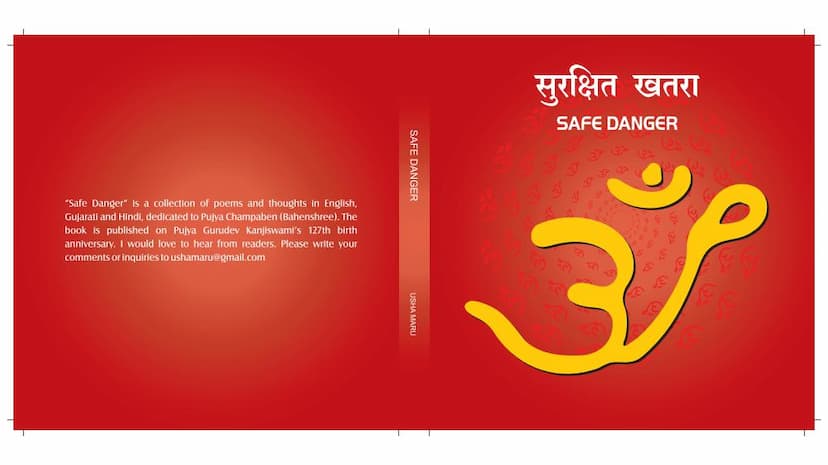Surakshit Khatra
Added to library: September 2, 2025

Summary
Here's a comprehensive summary of the Jain text "Surakshit Khatra" (Safe Danger) by Usha Maru, based on the provided pages:
Book Title: Surakshit Khatra (Safe Danger) Author: Usha Maru Publisher: Hansraj C. Maru Purpose: The book is a collection of poems and thoughts in English, Gujarati, and Hindi. It is dedicated to Pujya Champaben (Bahenshree) and published on the 127th birth anniversary of Pujya Gurudev Kanjiswami.
Core Themes and Message:
The central theme of "Safe Danger" revolves around the discovery and realization of the true nature of the soul (the self) within the context of Jain philosophy, as taught by Gurudev Kanjiswami and Pujya Champa Bahen Shree. The title itself, "Safe Danger," hints at a profound paradox: true safety is found not in external security or comfort, but in recognizing the inherent danger of remaining unaware of one's true, pure, and blissful soul.
Key Concepts and Teachings:
- The Soul as the True Self: The book emphasizes that the soul is the true, eternal, pure, free, and blissful self. It is distinct from the body, senses, mind, and emotions. The soul is the "knower" (jnata), possessing infinite qualities and experiencing pure bliss, peace, and happiness.
- Beyond External Attachments: The poems and thoughts encourage a detachment from worldly possessions, relationships, and sensory experiences, which are seen as temporary and the source of suffering. True happiness and peace are found within the soul.
- The Role of the Guru: The importance of a true Guru (spiritual teacher) is highlighted as an awakener who guides individuals to their true nature. The Guru's teachings, like those of Gurudev Kanjiswami and Pujya Kundkund Acharya, are presented as essential for this realization.
- True Religion is Inner Experience: The book posits that true religion is not found in external institutions (temples, rituals) but in the inner experience and realization of one's true self.
- Knowledge vs. Knowing: There's a distinction made between acquiring theoretical knowledge about the world and the deeper experience of "knowing" (the knower, the soul). True knowledge is the realization of the self, which is independent and complete.
- Love as Innate Bliss: True love is described not as an emotional attachment with fears and expectations, but as an innate, giving, and unwavering bliss that emanates from the soul.
- Personal Responsibility (Purusharth): The book stresses that the effort (Purusharth) to realize one's true nature is an individual journey. One's own goodness and weakness originate within.
- Overcoming "Half-Truths": The author criticizes the tendency to rely on "half-truths" or incomplete knowledge, which leads to confusion and error, both in worldly matters and spiritual pursuits. The quest for complete truth, though challenging, is paramount.
- The "Flow" of Life: Life is depicted as a constant flow of experiences, but true stability and peace are found by identifying the constant, unchanging self (the soul) within this flow.
- Detachment from "Instant Gratification": The book cautions against the modern allure of instant gratification, which offers temporary happiness and distracts from the deeper, everlasting bliss of the soul.
- The Paradox of "Safe Danger": The title "Safe Danger" likely refers to the danger of remaining ignorant of the soul's true nature. The "safety" lies in recognizing this danger and embarking on the path of self-realization, which is ultimately safe and leads to eternal bliss.
Structure and Content:
The book is organized into numerous short poems and prose reflections, each exploring a facet of Jain philosophy. These include:
- Conceptual Explorations: "Flow," "Guru," "Institutions," "Knowledge - Knower," "Love," "My Own," "Rest in Peace! Live in Peace," "Wealth," "What I know!," "When I Met," "World Has So Much Suffering," "Why Safe Danger?"
- Spiritual Insights: "A Poem to Share," "Devotee," "Instant Gratification," "Learning," "Match," "Pure and Applied?," "The Wedding," "My Name," "Safe," "Flow," "Guru," "Institutions," "Knowledge - Knower," "Love," "My Own," "Rest in Peace! Live in Peace," "Shanti Path," "Wealth," "What I know!," "When I Met," "World Has So Much Suffering."
- Gujarati and Hindi Poems: A significant portion of the book consists of poems in Gujarati and Hindi, such as "સ્વભાવ," "જણનાર," "પોતામાં જ સમાઈ જવાની છું," "નવરાત્રિ," "નિજપદ સિદ્ધપદ મારો," "પરમેશ્વર," "પ્રમાણ દ્રવ્ય," "બોલ ૧૦૧," "મારી ભાવના," "સદગુરુ," "સર્વજ્ઞનું જ્ઞાન," "સુરક્ષિત ખતરો," "જીવ તું જાણ," "નિજમય થાજે," "પાણી કહો કે કમળ," "પ્રસંગ," "શબ્દો ને હું," "જીવની સાત ભૂલો," "સ્મૃતિ," "હું કોણ," "હું છું અતીન્દ્રિય," "આસ," "ઇચ્છાયે," "ઉપકારી સદા," "ઘણા ધર્મ," "કર્તા કર્મ," "કહાનિયા," "કેસી ઈચ્છા?," "ક્ષમાવાણી," "ખાલી હાથ," "ગુરુ મળે," "જાનું તો જાનું સ્વયંને," "જાળ," "જ્ઞાન તો જ્ઞાન જ છે," "જ્ઞાન બહેતા કેવળ જ્ઞાનમાં જ," "તાજમહેલ," "દોડ કે મીલ લે," "નઈ કલી ખીલી," "પૂર્ણ સત," "પ્રભુ," "માનવ," "મુઝે ગાવરા નહિ," "મેરા જીવન ધન્ય," "મેરે જ્ઞાન કા સાથી," "મેં થકતા નહિ," "મેં હી ધ્રુવ તારા," "મેને હે ખાયા ઓર ખીલયા," "રાગ," "વિધી કા વિધાન," "સમુદ્ર," "સ્વતંત્ર સ્વરૂપ," "હાર ફિર જીત." These poems delve into the nuances of self-realization, detachment, and the nature of the soul.
Dedication and Inspiration:
The book is dedicated to Pujya Gurudev Kanjiswami and Pujya Champa Bahen Shree. The author, Usha Maru, expresses a deep personal connection to Pujya Champa Bahen Shree's letter and the teachings of Gurudev Kanjiswami, finding them awakening and inspiring. The poems are a direct result of this inspiration.
Overall Message:
"Surakshit Khatra" is a profound exploration of the spiritual path, urging readers to turn inward and discover the unadulterated bliss and freedom of their true soul. It challenges conventional notions of safety and danger, suggesting that true safety lies in self-awareness and the realization of one's eternal, pure nature, which is inherently complete and blissful. The book serves as a guide and inspiration for anyone seeking to understand the essence of Jain philosophy and the true nature of the self.